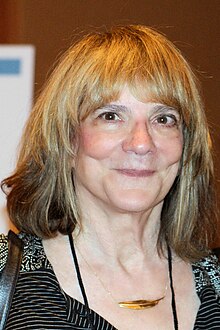Elizabeth Loftus
American cognitive psychologist
Elizabeth F. Loftus (born 1944) is an American psychologist and expert on human memory.

| This article about a psychologist is a stub. You can help out with Wikiquote by expanding it! |
Quotes
editEyewitness Testimony (1979)
editHarvard University Press, 1966
- In real life, as well as in experiments, people can come to believe things that never really happened.
- p. 62
- The results were clear: the new environment inhibited recognition.
- p. 90
- To be cautious, one should not take high confidence as any absolute guarantee of anything.
- p. 101
- The problem is clear: the unreliability of eyewitness identification evidence poses one of the most serious problems in the administration of criminal justice and civil litigation.
- p. 179
Trust your memory? Maybe you shouldn't (05/18/2013)
editJacque Wilson, CNN
- Even if it's going to be a harmful memory, they don't want to let it go. (This is) why sometimes I get such resistance to the work I do. Because it's telling people that your mind might be full of much more fiction than you realize. And people don't like that.
- Which would you rather have? A kid with obesity, heart problems, shortened lifespan, diabetes -- or maybe a little bit of false memory?
How reliable is your memory? June 2013
editTEDGlobal 2013
- Memory works like a Wikipedia page: You can go in there and change it, but so can other people.
Alison George, New Scientist
- It is possible not to think about something for a long time, even something unpleasant that happened to you. But what's been claimed in these repressed-memory cases is something, by definition, that's too extreme to be explained by ordinary forgetting and remembering. They're saying that in order to go on in life, you had to wall off this memory, because it would be too painful to live with. Then finally you go into therapy and crack through the repression barrier and out comes this pristine memory. But there really is no credible scientific support for that notion.
- Therapists probably can't ethically do it, and they may have anti-deception provisions in their standards of conduct. But bad governments, bad people, they don't have requirements of conduct. When we recently published a study about planting false memories among U.S. soldiers, I was worried we were putting out a recipe for how you can do horrible things to somebody and then wipe their memory away.
- I collaborated on a brain imaging study in 2010, and the overwhelming conclusion we reached is that the neural patterns were very similar for true and false memories. We are a long way away from being able to look at somebody's brain activity and reliably classify an authentic memory versus one that arose through some other process.